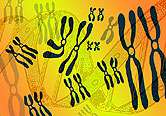Age, obesity affect gene expression in symptomatic BPH

(HealthDay)—Age and obesity affect gene regulation in men with symptomatic benign prostatic hyperplasia, according to a study published in the October issue of The Journal of Urology.
Seth K. Bechis, M.D., from Massachusetts General Hospital in Boston, and colleagues analyzed prostate samples from men undergoing transurethral prostate resection. Common assays were used to evaluate expression of 5α-reductase type 2 protein and gene promoter methylation status. Clinical variables were also assessed.
The researchers found that body mass index and age significantly correlated with methylation of the 5α-reductase type 2 gene promoter (P < 0.05), whereas there was no correlation with prostate volume, prostate-specific antigen, or benign prostatic hyperplasia medication. There was a strong association between methylation and 5α-reductase protein expression (P < 0.0001). Increasing age and body mass index significantly predicted methylation status and protein expression (P < 0.01), in a predictive model.
"Our findings suggest an individualized epigenetic signature for symptomatic benign prostatic hyperplasia, which may be important to choose appropriate personalized treatment options," the authors write.
One author disclosed financial ties to the medical device industry.
More information:
Abstract
Full Text
Copyright © 2015 HealthDay. All rights reserved.















